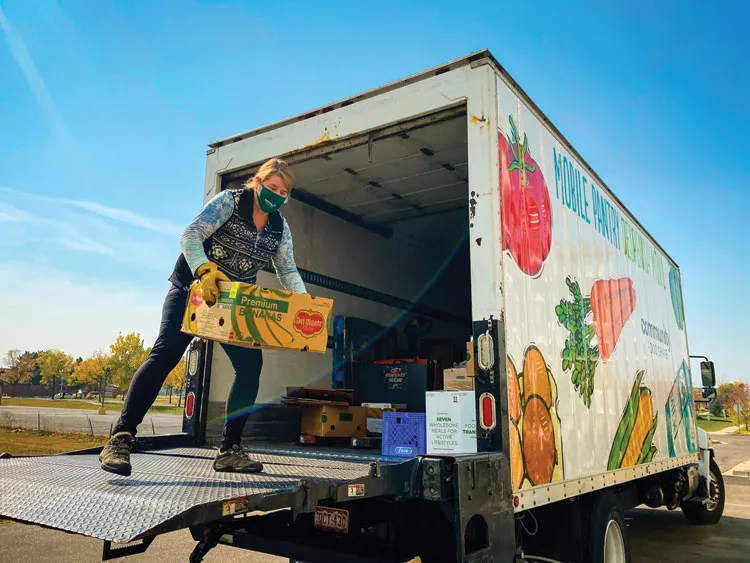Pandemic slaps down nonprofit fundraising
A BizWest Special Report

Sudden onset of the COVID-19 pandemic threw nonprofit organizations dependent upon event fundraising into turmoil.
The Larimer Leadership Breakfast — the annual Boy Scout fundraiser in Fort Collins — went off as planned on March 12 with attendees wondering whether they had made a wise decision to attend. The tables were full and the program inspiring. After that, almost no in-person events transpired.
Surely, this wouldn’t last long, many businesses and nonprofit organizations speculated at the time. Nonprofits delayed their events, but didn’t cancel.
SPONSORED CONTENT
As the pandemic wore on, long-time events — even the iconic Greeley Stampede and Cheyenne Frontier Days — were cancelled for the year.
Nonprofits dependent upon money raised at events entered panic mode. Even the third-party events by Rotary, Kiwanis, Optimists and others were put on hold, and the donations that might have been earmarked for a nonprofit vanished.
Nonprofits scrambled for alternatives.
Crossroads Safehouse in Fort Collins quickly learned that the need for its services would spike, while its financial resources went into the tank.
“We’re open 365 days a year, 24 hours a day,” said Pam Jones, executive director of the agency. “Our mission goes on regardless of the pandemic.”
“When the pandemic started, we became quiet and were not sure what we would do next,” she said. “We had to focus inward on the shelter side of the operation. As people were forced inside, they faced more domestic violence.”
Crisis calls jumped 42% through September. Yet people worried about coming to a shelter because of the illness. Jobless stress along with the disease itself all contributed to a buildup of negative energy around the home.
The agency is well aware of the lethality index, which says that a woman who is threatened with a gun by her partner is 20 times more likely to be murdered. “We saw six such cases a year ago but are seeing almost six a week now,” Jones said.
Crossroads embarked on a series of “couch concerts” in the spring in which entertainers performed online and people were encouraged to donate. The agency, which draws about 45% of its funding from federal, state and local grants, continued its operations. It received a PPP loan through the federal CARES Act.
It’s biggest fundraiser, the Prohibition Party traditionally held in October, moved online this year and, to some surprise, the event netted about $30,000, the same as the year prior. “Gross revenues were down but our largest sponsors came forward for us again, and we didn’t have the venue and food costs,” she said.
“We have to be prepared for what is coming,” Jones said. While she expects that nonprofits facing similar challenges will need to scale back, Crossroads is trying to maintain its budget because increases in clientele are expected. Eighty percent of the budget is staff, and most of them work in the shelter.
“Any size gift makes a huge difference to the people we serve,” she said, noting that the philanthropic spirit is alive in Northern Colorado and people give what they can.
Other nonprofits also have gone virtual where they can. “Boulder is a pioneer in the virtual space,” said Chelsea Carver, chief development officer for Mile High United Way, the agency that now serves not only metro Denver but also Boulder and Broomfield counties.
United Way has relied upon that innovation to help it through these times, although collecting donations has been made more difficult.
The traditional United Way approach of contacting employees of regional businesses to seek contributions and pledges slowed during the pandemic as many employees worked from home and gathering for meetings at businesses was not advised.
Premier Members Credit Union, whose CEO Carlos Pacheo sits on the Mile High board, moved its annual campaign to Zoom.
Xcel Energy, which traditionally had a chili cookoff, instead conducted a virtual event.
Demand for services paid for from United Way dollars either directly or through nonprofits has climbed, Carver said. Mile High runs the free 211 crisis line available to people seeking help with social needs. The line fielded 300 calls per day before the pandemic and is now responding to 2,100 calls per day.
“We’ll be announcing soon [before this story is published, she said] that our building will be an overflow warming shelter this winter. That’s the first time our building has been used for that.”
Jeannine Truswell, CEO of the United Way of Weld County, said her agency has suffered dramatically from the loss of events and inability to directly campaign at businesses.
“Many companies are so overwhelmed with the pandemic that they don’t have time to run the campaigns,” she said. Hospitals are preoccupied with their core mission of treating patients, many of them coronavirus patients, and aren’t able to do even email campaigns.
“We do an amazing campaign at JBS [the meat packer in Greeley]; we used to go in once a week and meet with new employees. We can’t do that now,” she said. In the past, JBS employees accounted for about $100,000 in contributions to the United Way.
State Farm, which recently announced that it is closing its Greeley office, accounted for $150,000 in the past and is now about $10,000, she said.
Truswell said United Way and the Community Foundation of Weld County have worked together on a COVID relief campaign. But she noted that in 2013, the joint campaign to aid victims of the regional flood raised $2 million, while the COVID campaign raised $330,000.
“This is a different kind of disaster,” she said, noting that the widespread, community-wide nature of the disease is affecting donors as well as victims.
“On the flip side, our United Way has gotten multiple grants to help nonprofits and has received CARES Act funding from local governments” to help with the direct services that the United Way provides.
The annual auction and dinner in the Spring was cancelled, “but sponsors said they did not want their money returned,” she said. An online auction raised some but not as much as previous in-person auctions have raised.
“The board sometimes asks what keeps me up at night, and I’m worried that [if the pandemic continues] we’ll have to make drastic reductions in operations.
“I keep a close eye on what’s happening in the world and the news about the vaccine — and I know the general populace won’t be vaccinated until April. If this were to go on a year or two, we’d have to start with a white piece of paper and start over,” she said.
Community Food Share in Boulder County didn’t have to start over, but it did have to find new ways to stock its food pantry.
Julia McGee, director of communications for the food bank, said massive numbers of unemployed community members caused food demand to spike. “We saw real generous community support at the beginning, but that has waned,” she said.
“Recovery is going to outlast the virus itself,” she said.
The agency stopped doing food drives at the beginning of the pandemic because of concern for safety. Instead of food, it is asking for cash, which it can make go further. “Every $1 results in three full meals,” she said.
It is running virtual food drives and has used technology to create a “self-serve” food drive opportunity. Individuals or groups can set up a food drive on the food bank’s website, set a goal, create a link and send that link to people in their network.
Finding new ways of doing things have also been in the offing for the United Way of Larimer County.
“We felt fortunate that we’d been using mobile fundraising platforms even before the pandemic,” said Allison Hines, senior vice president of resource development for the agency. United Way of Larimer subscribes to a service called Mobile Cause, which has elements such as “text to give,” virtual events and platforms to run mini campaigns around a theme.
Its annual event in June was all virtual, with the United Way using matching dollars from some donors to incentivize others to give.
She said the agency is creating unique pages for businesses to use in their annual United Way drives built around cutest pet contests or Halloween costume contests, with participants voting with their dollars.
Hines said disaster fundraising done in collaboration with the Community Foundation of Northern Colorado — for both pandemic relief and the forest fires in the county — has resulted in a sense of urgency, but disaster fundraising has also impacted the standard collection of donations. Disaster contributions, $1.27 million for the pandemic and $700,000 for fires, are earmarked and can’t be used for the traditional United Way programming and support of nonprofits.
“COVID has brought to light problems in the community that were already there,” she said in reference to increased demand for domestic violence services or food pantry services. “We’re fortunate that our economy is better than a lot of places. They’re [donors] stepping up. They’re maintaining,” Hines said.
She said the United Way’s largest business donor, The Group Inc., has continued in that position because real estate sales have remained strong. Another large donor, Nutrien Ag Solutions Inc., is still doing well and has maintained its support.
She said the agency, which operates on a fiscal year of July 1 through June 30, budgeted down 15% for the current year. “If you back out the disaster fundraising, we’re coming in about 5% to 10% less” than what was collected a year ago.
“Larimer County is a very generous community, and we’re fortunate to live and work here,” Hines said.
The Mile High United Way’s Carver echoed that sentiment and said that nonprofits around the country are hopeful as the year comes to a close that donations will come forward.
“The end of the year is so important for nonprofits. It’s the Super Bowl, if you will. It probably won’t be a great year for anyone, but hopefully basic needs will be met,” she said.
“Once we have a vaccine, then let’s hope the togetherness and grace that people have shown during this period will continue,” Carver said.
Sudden onset of the COVID-19 pandemic threw nonprofit organizations dependent upon event fundraising into turmoil.
The Larimer Leadership Breakfast — the annual Boy Scout fundraiser in Fort Collins — went off as planned on March 12 with attendees wondering whether they had made a wise decision to attend. The tables were full and the program inspiring. After that, almost no in-person events transpired.
Surely, this wouldn’t last long, many businesses and nonprofit organizations speculated at the time. Nonprofits delayed their events, but didn’t cancel.
As the pandemic wore on, long-time events — even the…



